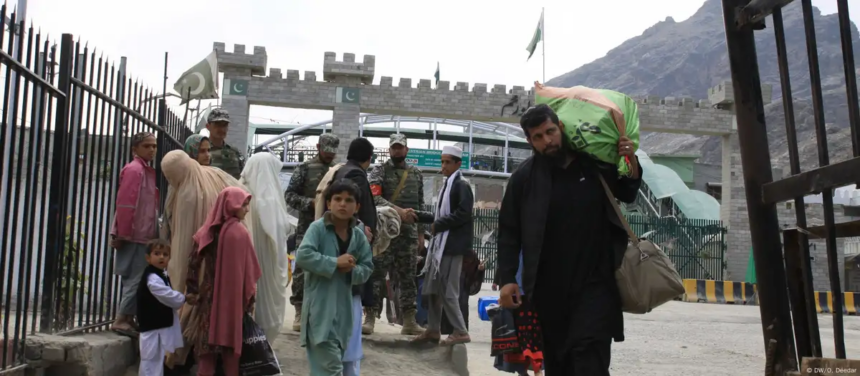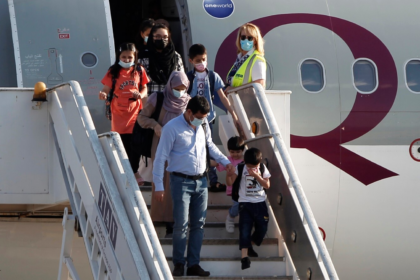RASC News Agency: The Torkham crossing, one of the most crucial lifelines between Afghanistan and Pakistan, was partially reopened on Saturday, October 10, following several weeks of closure. The limited reopening allows only the return of deported Afghanistani refugees, while the movement of traders, patients, and regular passengers remains completely suspended, prolonging both economic paralysis and human suffering on an alarming scale.
Eyewitnesses and local sources in the Torkham area reported that, from the early hours of the morning, dozens of destitute Afghanistani families expelled from Pakistan were granted passage by Pakistani border authorities to re-enter Afghanistan. Yet, the crossing remains firmly shut for all other categories of travelers, including patients seeking urgent medical care in Pakistan and merchants transporting essential goods across the border.
The reopening follows eight days of violent border clashes between Pakistan’s military and Taliban forces, which left the Torkham route completely sealed. These confrontations stemming from persistent disputes over cross-border militancy and Pakistan’s accusations that the Taliban harbor and protect the Tehrik-e-Taliban Pakistan (TTP) have once again deepened the political rift and eroded the already fragile trust between Islamabad and the Taliban regime.
Local businessmen warn that the prolonged closure of Torkham has inflicted severe economic losses on both sides of the border. Hundreds of trucks loaded with perishable goods have remained immobilized for weeks, causing tons of fresh produce to rot under the blazing sun. Drivers stranded in the no-man’s land between the two countries describe grueling days of hunger, heat, and deprivation, forced to sleep in their vehicles as they await clarity from political leaders who appear either powerless or indifferent.
Taliban officials in Nangarhar have reluctantly confirmed that the limited reopening is intended only to facilitate the repatriation of refugees deported by Pakistan. However, they have refused to commit to restoring full commercial or passenger movement, insisting that such a decision depends on the outcome of “ongoing negotiations” with Islamabad talks that many regional observers view as performative and strategically hollow.
The three-week closure of this vital artery has not only disrupted trade but also precipitated an escalating humanitarian crisis. Hundreds of patients who rely on medical facilities in Pakistan remain trapped on the Afghanistani side, unable to cross. Many among them are women and children suffering from chronic illnesses, languishing without medical care, food, or shelter. Aid organizations have warned that the humanitarian toll is worsening daily, while the Taliban administration continues to demonstrate neither capacity nor willingness to address the suffering of its citizens.
Economically, Torkham serves as Afghanistan’s principal commercial gateway to Pakistan and beyond. Any interruption in its operations immediately sends shockwaves through Afghanistani markets causing price spikes, shortages of essential commodities, and further deterioration of the already crippled economy. Yet, instead of coordinating an effective diplomatic response, the Taliban leadership appears more focused on issuing rhetorical threats and ideological posturing, deepening Afghanistan’s isolation at a moment when pragmatic diplomacy is most needed.
Despite Saturday’s partial reopening, normalization remains a distant prospect. The atmosphere along the border is fraught with tension, and mutual distrust continues to define the Kabul-Islamabad dynamic. Analysts argue that Pakistan is increasingly using border closures as a pressure mechanism to compel the Taliban to take action against militant networks operating from Afghanistani territory an issue the Taliban leadership persistently denies while quietly allowing such groups to flourish.
In reality, the Torkham standoff illustrates the Taliban’s failure to govern effectively or to establish meaningful international relations. Their inability to secure border stability, manage trade, or respond to humanitarian crises underscores a deeper truth: the group’s obsession with power and ideology has left Afghanistan economically paralyzed, diplomatically isolated, and socially fragmented.
Until a credible political agreement is reached one that addresses both Pakistan’s security concerns and the Taliban’s harboring of militant factions the Torkham crossing will remain not merely a border post but a symbol of the Taliban’s incompetence and the growing disillusionment of the Afghanistani people.






